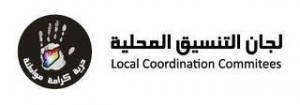 The Syrian National Council on Friday asked for a delay to a decision on uniting President Bashar al-Assad’s foes but a major activist network quit the bloc and other groups went ahead with a unity meeting.
The Syrian National Council on Friday asked for a delay to a decision on uniting President Bashar al-Assad’s foes but a major activist network quit the bloc and other groups went ahead with a unity meeting.
Meeting in Doha, the SNC sought to have the decision made on Saturday after it chooses a new chief, having already elected a 41-member secretariat, a third of them Islamists, and as it faces charges of not being representative enough.
“We requested a postponement of 24 hours — we are in the electoral process,” Ahmad Ramadan, a member of the new team, told AFP.
But the Local Coordination Committees, a major network of on-the-ground activists, said it had withdrawn from the SNC over its failure to adopt “serious and effective” reforms to make it more representative.
“It is clear to us now that the Syrian National Council is not fit to assume such a role, especially after the disappointing results of its restructuring attempts,” said the LCC.
“The Local Coordination Committees hereby declares its withdrawal from the Syrian National Council.”
Other opposition groups, who were waiting at a hotel in the Qatari capital, decided to go ahead with their meeting on Friday evening, regardless of the SNC’s demand for a delay.
“The SNC requested a postponement until tomorrow, but one more day is not so serious for a noble cause,” prominent opposition dissident Riad Seif told AFP.
However, another opposition figure, Haytham Maleh, criticised the SNC.
“The SNC’s request for a deal is a bad thing because it wants to control everything, and the only thing that’s important to them is to lead, when Syrian blood being spilt should be our first consideration,” he said.
The umbrella group on Friday elected 11 members to sit on its executive committee, including Christian dissident George Sabra. Four members are new and three others are Islamists.
“We hope that these free and transparent elections will be a model for free elections in Syria,” Sabra told AFP, stressing that the new executive represents all sectors of society, including for the first time the tribes.
Representatives of various opposition groups were said to be close to reaching an agreement over a united structure when they gathered in Doha on Thursday.
But representatives of the SNC, which is vying to keep its leading role and is under US pressure to unite, voiced reservations about the initiative, based on a proposal tabled by Seif with apparent US support.
SNC counter-proposal
The plan put forward at Thursday’s meeting, called by host Qatar and the Arab League, appeared to be a modified version of Seif’s initiative, proposing an umbrella body of some 60 members, representing the SNC, civilian groups active on the ground, armed groups, Muslim scholars and others.
This body would in turn form a transitional government of some 10 members, and a military council.
The SNC, formed six months after the anti-regime uprising began in March 2011, has proposed “holding a national congress of 300 members in liberated territories” in order to add “revolutionary legitimacy” to any executive, according to SNC member Najati Tayara.
Such a congress would form a transitional government that would run territories seized by the rebels, channel humanitarian aid and direct military operations, he said.
US Secretary of State Hillary Clinton last week called the SNC unrepresentative of opposition forces on the ground and said it “can no longer be viewed as the visible leader of the opposition.”
The SNC, which fears marginalisation in a new structure, in return accused Washington of undermining the revolt and “sowing the seeds of division.”
Ahmed Ben Helli, deputy head of the Arab League, said delegates had been urged to overcome the divisions that have dogged their efforts to unseat Assad.
Qatar’s Prime Minister Sheikh Hamad bin Jassem al-Thani, on opening the meetings, urged them to “unify their ranks and positions and to prioritise the interests of their nation and people over their own personal interests.”
AFP

Leave a Reply
You must be logged in to post a comment.